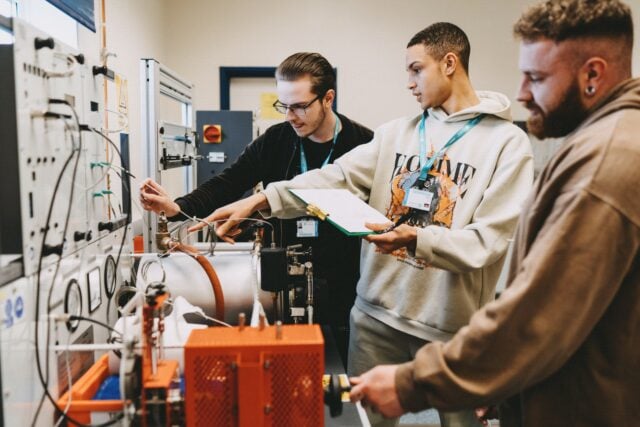Engineering is a fascinating subject, brimming with innovation and opportunities. It’s about utilising science and mathematics to solve real-world challenges, impacting industries from healthcare to technology, transportation to infrastructure. In this blog post, we’re spotlighting two major disciplines: electrical and mechanical engineering. If you’re contemplating these as your prospective fields of study, you’re on the brink of a thrilling journey. A vast array of career prospects awaits engineering graduates, paving the way for a fulfilling career full of creativity and advancement. Let’s delve deeper and explore the exciting journey an engineering degree from a UK university can set you on!
Jobs You Can Do With An Engineering Degree
What Jobs Can You Do With An Engineering Degree?
Engineering2022 (6)-600x400.jpg)
Electrical Engineering Careers
Electrical engineering is a dynamic discipline, it involves the study and application of electricity, electronics, and electromagnetism, laying the foundation for many of the technologies we use today. Job opportunities abound in various sectors, including power generation and distribution, telecommunications, electronics, and automation.
As an electrical design engineer, you could be responsible for developing and enhancing electrical systems and products. A power systems engineer may be in charge of ensuring the safe and efficient distribution of electrical power, while a control systems engineer could find themselves optimising systems that control and automate industrial operations. Telecommunications engineers, on the other hand, are critical in the design and maintenance of the networks that keep us connected. Find out more about studying an electrical engineering degree.
Mechanical Engineering Careers
Mechanical engineering is another broad discipline, encompassing the design, analysis, and manufacture of mechanical systems. This branch of engineering has a hand in nearly every industry you could think of – manufacturing, automotive, aerospace, energy, and robotics, to name just a few.
Mechanical design engineers focus on developing and improving machines and equipment. Manufacturing engineers work to optimise production processes, while quality engineers ensure that products meet specific standards and regulations. In a role as an HVAC engineer, you could be designing, installing, and maintaining heating, ventilation, and air conditioning systems. Learn more about Mechanical Engineering degrees.
Renewable Energy and Sustainable Engineering
With growing global attention on climate change and sustainability, there’s a rising demand for engineers who can contribute to the development of renewable energy technologies. In this field, engineers might work on projects related to solar power, wind energy, or bioenergy.
Renewable energy engineers work on the forefront of energy technology, creating and improving methods for extracting energy from renewable sources. As a solar engineer or a wind energy engineer, you would be focusing specifically on harnessing the power of the sun or wind to generate energy.
Automation, Robotics, and AI
The fields of automation, robotics, and artificial intelligence (AI) are evolving rapidly, presenting a plethora of opportunities for engineers. These sectors require the expertise of both electrical and mechanical engineers to design, develop, and maintain the sophisticated technologies that underpin them.
As an automation engineer, you could be creating systems to streamline and automate industrial processes. A role as a robotics engineer would involve designing and developing robots, while mechatronics engineers work at the intersection of mechanical, electrical, and computer engineering. AI systems engineers play a key role in developing and implementing AI technologies.
Engineering Consulting and Project Management
Engineering consulting and project management are fields where engineers can use their technical knowledge and problem-solving skills to guide companies and organisations. In these roles, engineers provide expert advice, develop strategies, and manage projects to ensure they are completed on time, on budget, and to specifications.
Research and Development (R&D)
R&D roles offer engineers the opportunity to push the boundaries of technology and develop innovative solutions. As a research engineer, product development engineer, or innovation specialist, you could be at the cutting edge of technological advancements, making discoveries that change the world.
Whether you’re interested in research and development, eager to break new ground in renewable energy, or considering launching your own startup, an engineering degree can equip you with the skills and knowledge you need to succeed. For more information on starting your journey in engineering, explore the HNC Engineering (Mechanical) and HNC Engineering (Electrical and Electronic) courses at the University Centre Peterborough.
An engineering degree, be it in electrical or mechanical disciplines, can open doors to a wide range of career opportunities. From traditional roles in design and manufacturing to cutting-edge fields like renewable energy and AI, there’s a place for engineers in virtually every sector of our economy. And with the ever-growing demand for sustainable, efficient, and intelligent systems, the future for engineers looks brighter than ever. Whether you’re interested in research and development, eager to break new ground in renewable energy, or considering launching your own startup, an engineering degree can equip you with the skills and knowledge you need to succeed. For more information on starting your journey in engineering, explore the HNC Engineering (Mechanical) and HNC Engineering (Electrical and Electronic) courses at the University Centre Peterborough.
Engineering2022 (14)-600x400.jpg)
Engineering2022 (22)-1024x683.jpg)
Engineering Courses
At University Centre Peterborough, our Engineering courses are delivered from our esteemed Peterborough campus.







General2022 (160)-1024x683.jpg)